February 16, 2018
Edited by David Sanders
Specimen Days
1075—Ordericus Vitalis, French monk/historian/poet, is born.
1866—Vyacheslav I Ivanov, Russian philosopher/classical/poet [NS=Feb 28], is born.
1881—Maurits H E Uyldert, Dutch poet/writer (Youth of a Poet), is born.
1898 —Thomas Bracken, New Zealand poet (b. 1843), dies.
1929—Peter NF Porter, Australian/British author/poet (Chair of Babel), is born.
1949—Dorus Vrede, Surinam poet (Otobanda; the Other Bank), is born.
1934—Eduard Bagritsky, [Dzjubin], Russ poet/journalist, dies at 38.
1992—George Mann MacBeth, Scottish journalist/poet (A War Quartet), dies.
2011—Justinas Marcinkevičius, Lithuanian poet and playwright (b. 1930), dies.
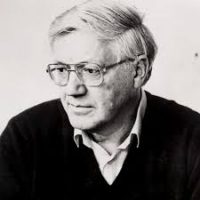
This side of the bridge
There is a toll – it’s like the seventy stairs
You have been up and down a million times;
It is paid in lifetime familiarity.
Now they are seen to be carrying, everyone
The same burden, the command to love,
Where some object might exist as proof
Or all the stars collate the obligation.
—from A Chorale at the Crossing by Peter Porter
“There is a toll – it’s like the seventy stairs / You have been up and down a million times” – Peter Porter
World Poetry
South Korea's Top Poet under Fire over Sexual Abuse Scandal
A top South Korean poet regularly tipped for the Nobel prize for literature has been accused of sexual abuse by another famed writer — in the form of a poem.
Choi Young-mi, in her recent composition "Monster", described sexual harassment she suffered at the hands of a poet named “En". She did not explicitly identify "En" in her poem, or in a subsequent television interview. But the character's biographical details match those of Ko Un, a 84-year-old former Buddhist monk, who is one of the South's most respected contemporary poets and an outspoken political campaigner who champions reunification with the North.
Poet Arrested after Returning Home

Poet Naema Ahmed Ibrahim was arrested without charge on 27 January 2018 by National Intelligence Agency authorities at Egal International Airport in Hargeisa where she was scheduled to fly back to Mogadishu, according to Freemuse sources and local news and human rights organisation reports. Additionally, the female poet has been denied visits from her family after her father gave interviews to media explaining what happened. The female poet travelled to Hargeisa to visit her father who was recovering from an operation. Authorities arrested her when she attempted to fly back to Mogadishu where she works and performs.
Six Arrested for Attack on Malayalam Poet
The police arrested six persons, said to be RSS workers, in connection with mobbing and threatening poet Kureepuzha Sreekumar here on Monday night. He was allegedly abused and jostled around while on his way back from a cultural event organised by a library at Kottukal, near Kadakkal. In his speech the poet had allegedly criticised Right-wing activists in the wake of the Vadayampady ‘caste wall’ issue.
Poet Naema Ahmed Ibrahim was arrested without charge by National Intelligence Agency authorities at Egal International Airport in Hargeisa.
Recent Reviews
Could the Odyssey Have Been the Work of a Woman?
Its cast of clever, bewitching queens and goddesses certainly suggests a feminine touch. And in Emily Wilson proves an appropriately beguiling female translator
by A. E. Stallings
Until recently, it seemed we were living in an age of Iliads. Since 2007, the ancient Homeric epic has been translated into English at least seven times (including by Caroline Alexander, the first woman to do so). Yet the Iliad’s sequel, the Odyssey — about war’s aftermath, the home front and the difficult return to civilian life — is just as topical. And with its greater emphasis on female characters and different walks of life, it should appeal to a broader audience. Until now, it has not been translated into English by a woman. Does this make a difference? Emily Wilson, in the introduction to her sleek translation, argues that it does.
Douglas Crase, The Astropastorals
by Ian Pople
Douglas Crase’s The Astropastorals is a slim pamphlet of the ten poems Crase has chosen to publish since he published The Revisionist in 1981. The Revisionist gained immediate praise; its dustjacket had puffs from John Ashbery and James Merrill.
Don’t Call Us Dead by Danez Smith Review – hope in resistance and rebirth
Anger, generosity and dark humour electrify a collection that confronts America racism and speaks urgently for change
by Sandeep Parmar
In addressing US national identity and collectivism, Danez Smith (who goes by the gender-neutral pronoun “they”) echoes the plural, expanded lyric voices of poets such as Walt Whitman, Allen Ginsberg, Amiri Baraka and Langston Hughes. Like Smith’s prize-winning debut collection, [insert] boy, their follow-up Don’t Call Us Dead excoriates America for its violence towards citizens outside a white heterosexual majority. But whereas Ginsberg resolved finally, if reluctantly, in his poem “America” to put his “queer shoulder to the wheel” of the American project, Smith declares it dead. In the apocalyptic age of Trump, a man who “has no words / & hair beyond simile”, Smith prophesies an end from which a new beginning might spring.
The Radio by Leontia Flynn Review – sheer pleasure, no slog
Flynn’s entertaining new collection of poems really gets under the skin, with topics ranging from new motherhood to Alzheimer’s
byu Kate Kellaway
The title poem presents its own, empathetic kitchen sink drama. Anybody with an interest in poetry should be reading Leontia Flynn. Those with no interest should be reading her too: she has what it takes to overcome resistance. All mothers – especially new mothers – should read her. Her understanding of what it is to be a woman is one of the things (by no means the only thing) that makes this collection so powerful. Her thinking is complicated but never arrogantly inaccessible. I was bowled over by this, her fourth collection. I kept returning to poems for the sheer pleasure of them – no slog involved.
A Way of Living
Recent books by Geoff Cochrane, Tusiata Avia, Claire Orchard, Hera Lindsay Bird, and Bill Manhire.
by Daisy Fried
How to characterize a national poetry? The New Zealand poet Jenny Bornholdt, introducing her selections for her Best New Zealand Poems 2016 volume, managed only to say that her choices were “strong and various … New Zealand poetry is in fine working order.” In 2013, Jane Stafford and Mark Williams also demurred: “The field seemed amorphous … difficult to pin down.” An outsider, I have no such scruples (though I’d never dream of trying to characterize my fellow American poets). I read fifteen or so books by New Zealand poets published in 2017.
Danez Smith echoes the plural, expanded lyric voices of poets such as Walt Whitman, Allen Ginsberg, Amiri Baraka and Langston Hughes.
Broadsides
TS Eliot's The Waste Land Remains One of the Finest Reflections on Mental Illness Ever Written
by Jonathan McAloon
The poet’s modernist masterpiece gathered fragments of an arduous life, some of which can be traced to a seafront shelter in Margate
In 1921, having taken time off from his job at Lloyds Bank for what would now be called depression, TS Eliot spent three weeks convalescing in Margate. It was the hottest October in years. Every day, he got the tram from the Albemarle Hotel in Cliftonville to the sea front, and, sitting in Nayland Rock shelter, he wrote “some 50 lines” of his poem The Waste Land.
Running into Capitalism: John Ashbery's 'Girls on the Run'
by Sandra Simonds
If we push the uncritical romantic views of the outsider artist aside, it’s difficult not to read Henry Darger’s In the Realms of the Unreal as embodying the dynamics of an abuse narrative. His epic uses multiple mediums: newspaper clippings, stenciled drawings, watercolor paintings, and narrative fiction to depict a child slave rebellion against their Glandelinian overlords. The heroines of Darger’s allegory of Christian martyrdom are the Vivian girls, rendered by the author in a range of disturbing, one-dimensional fashions: the girls are shown, by turns, adventuring through idyllic, Edwardian landscapes, and falling prey to the grotesqueries of absolute violence, hanged in a field or strangled. Notable is that Darger often draws male genitalia on the little girls, a fact overlooked by many as mere curiosity. John Ashbery encountered Darger’s work in the 1990s and this encounter inspired the corresponding long poem, Girls on the Run.
In 1921, having taken time off from his job at Lloyds Bank due to depression, TS Eliot spent three weeks convalescing in Margate.
Drafts & Fragments
Plagiarism Software Unveils a New Source for 11 of Shakespeare’s Plays
by Michael Blanding
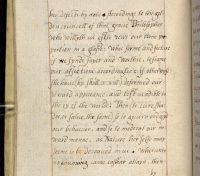
For years scholars have debated what inspired William Shakespeare’s writings. Now, with the help of software typically used by professors to nab cheating students, two writers have discovered an unpublished manuscript they believe the Bard of Avon consulted to write “King Lear,” “Macbeth,” “Richard III,” “Henry V” and seven other plays. “If it proves to be what they say it is, it is a once-in-a-generation — or several generations — find,” said Michael Witmore, director of the Folger Shakespeare Library in Washington.
New Poetry by Indigenous Women
by Natalie Diaz
In my Mojave culture, many of our songs are maps, but not in the sense of an American map. Mojave song-maps do not draw borders or boundaries, do not say this is knowable, or defined, or mine. Instead our maps use language to tell about our movements and wonderings (not wanderings) across a space, naming what has happened along the way while also compelling us toward what is waiting to be discovered, where we might go and who we might meet or become along the way.
Two writers have discovered an unpublished manuscript they believe Shakespeare consulted to write eleven of his plays.
Poetry In the News
Mellon Foundation Names Poet and Writer as Next President

Elizabeth Alexander, whose memoir was a finalist in 2016 for the Pulitzer Prize and the National Book Critics Circle Award and who wrote and recited an original poem at Barack Obama’s 2009 inaugural, will be the next president of the Andrew W. Mellon Foundation, the country’s largest humanities philanthropy.
Poet, Visionary Richard Blanco to Be Artist in Residence at Colby’s Lunder Institute
Acclaimed poet and artistic visionary Richard Blanco, whose stirring words celebrated the 2013 Inauguration of President Barack Obama and whose creative spirit has been recognized around the world, will be in residence at the Colby College Lunder Institute for American Art starting this month. Blanco, the spring-semester artist in residence for the institute’s inaugural year, will teach, work in community programs, and offer a public reading of his work during his time in Waterville.
Elizabeth Alexander will be the next president of the Andrew W. Mellon Foundation, the country’s largest humanities philanthropy.
New Books
The Undressing: Poems by Li-Young Lee
[Hardcover] W. W. Norton & Company, 96 pp., $25.95
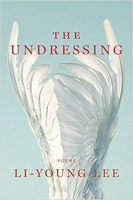
Celebrated poet Li-Young Lee returns with a breathtaking new volume about the violence of desire and the peace of love. The Undressing is a tonic for spiritual anemia; it attempts to uncover things hidden since the dawn of the world. Short of achieving that end, these mysterious, unassuming poems investigate the human violence and dispossession increasingly prevalent around the world, as well as the horrors the poet grew up with as a child of refugees. Lee draws from disparate sources, including the Old Testament, the Dao De Jing, and the music of the Wu Tang Clan. While the ostensive subjects of these layered, impassioned poems are wide-ranging, their driving engine is a burning need to understand our collective human mission.
I will not kick my friends by Kathleen Winter
[Paperback] Elixir Press, 88 pp., $17.00
I will not kick my friends by Kathleen Winter is one of the winners of the 17th Annual Elixir Press Poetry Awards. Contest judge, Jane Satterfield, had this to say about I will not kick my friends: "Sparkling, satirical, and highly referential, Winter's poems offer deep rewards. They consistently resist scholarly insularity, and the overall effect is a refreshingly choral, intoxicating verse." Bob Hicok said this: "Kathleen Winter is unusually attuned to the intersection of the imagined and the common place. She weaves her loves — personal, artistic, intellectual — into her daily life, making this a book of passionate intimacies. Kathleen's attitude — her appetite — is made clear by her vision of Eve in the poem, 'Noir' — 'He offered me the apple — / what could I do?' This is a wonderful book.”
Tramp: Poems by Joelle Biele
[Paperback] LSU Press, 96 pp., $19.95
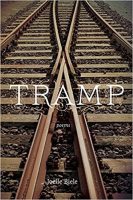
Using newspaper accounts and court records from the late nineteenth and early twentieth centuries, Joelle Biele’s poems tell the personal stories of women who left their homes and families to tramp the roads and rails. Driven by poverty, abuse, or a desire for a better life, these women often encountered misery and danger in their quest for freedom, as interviews and printed records attest. In Tramp, Biele weaves these real-life stories into poignant and insightful verse that gives us a window into previously unexplored lives.
Radioapocrypha by BK Fischer
[Paperback] Ohio State University Press, 82 pp., $16.95
A novella in verse, Radioapocrypha
The Dean of Discipline by Michael Waters
[Paperback] University of Pittsburgh Press, 80 pp., $15.95
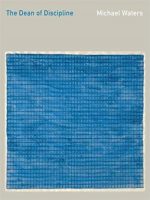
In the richly musical and boldly imaginative poems of The Dean of Discipline, Michael Waters explores the confluences of the sensual and the spiritual, and renders their mysteries with precision and clarity. The title evokes the rigorous consciousness that prods the artist to deepen into his craft. Line by line, Waters delivers the passionate eloquence and intensity that distinguish his poems.
Celebrated poet Li-Young Lee returns with a breathtaking new volume about the violence of desire and the peace of love.
Correspondences
The Poet Behind Coke’s Super Bowl Spot Wants All of Us to Bring More Art to Advertising
W+K's Becca Wadlinger wrote the brand's ode to individuality
by David Griner

When you hear a poem in an ad, especially a Super Bowl ad, it’s usually a safe and licensed choice lifted from the long-dead likes of Whitman or Frost. But Coca-Cola went a different direction with its Super Bowl ad, building it instead around a lovely and original poem about inclusiveness, identity, individuality and, yes, Coke. So was the ad written by a poet or a copywriter? Both, actually, in the form of Wieden + Kennedy Portland’s Becca Wadlinger, who cut her teeth on poetry long before she was recruited into the world of advertising. She has an MFA and Ph.D. in creative writing, plus a book of poetry on the way.
Johnathan Rice, a Beat Poet for the Instagram Generation
by Marissa G. Muller

For nearly every situation in these modern times, Johnathan Rice has a poem. Found your perfect match but their aesthetic doesn't line up with yours? Check "We Are Curated." Need to cancel on your friend you asked to visit you ages ago? Send them "U Flaky." Lost a bunch of Instagram followers? Take solace in "Final Bridge of Insecurity," which comprises one sad face emoji beneath the words "Losing followers / Never bothered the Jesus / But it bothers me." The only thing is, you'll have to log onto Instagram to read it. Somewhat ironically, that's where the musician-turned-poet has been sharing his meditations on our crumbling society in the wake of social media for the past year. In the process, his sharp-witted haikus—which he describes as "a little stop along the way as you scroll through your feed"—have amassed a following that includes Anne Hathaway, January Jones, Mandy Moore, and Busy Philipps.
Maureen N. McLane in Conversation
by Rachael Allen
Maureen N. McLane is the author of five poetry collections and of My Poets, a hybrid work of memoir and criticism. Her new book, Some Say, was published by Farrar, Straus and Giroux in July 2017. McLane talked to our poetry editor, Rachael Allen, about ecology, lyric authority, and balancing poetry with criticism.
A copywriter with an MFA and Ph.D. in creative writing wrote a Coca-Cola ad that aired during the Super Bowl.
Envoi: Editor’s Notes
"The Waste Land"
The article above cites Eliot's "The Waste Land" as an apt reflection on mental illness. I concur. I can remember some years ago, after dealing with a mood disorder, I put a cassette tape of Eliot reading his poem into my car's player as I started off on a two-hour-long trip. What was I thinking? It wasn't very long into the trip before I had had enough. The sound of his voice on that scratchy recording as it mimicked the broken bits of dialogue sounded like I'd tuned in a radio station from some haunted past. It became too much and I ejected it. Even more so than the words on the page themselves allow, his voice brings out the terror behind the poem. If you're up to it, get a hold of the recording and give it a listen. For my part, even after the better part of a decade, I'm fine not going back to it yet. I'll stick with "The Four Quartets."
“Even more so than the words on the page themselves allow, his voice brings out the terror behind the poem.” – David Sanders